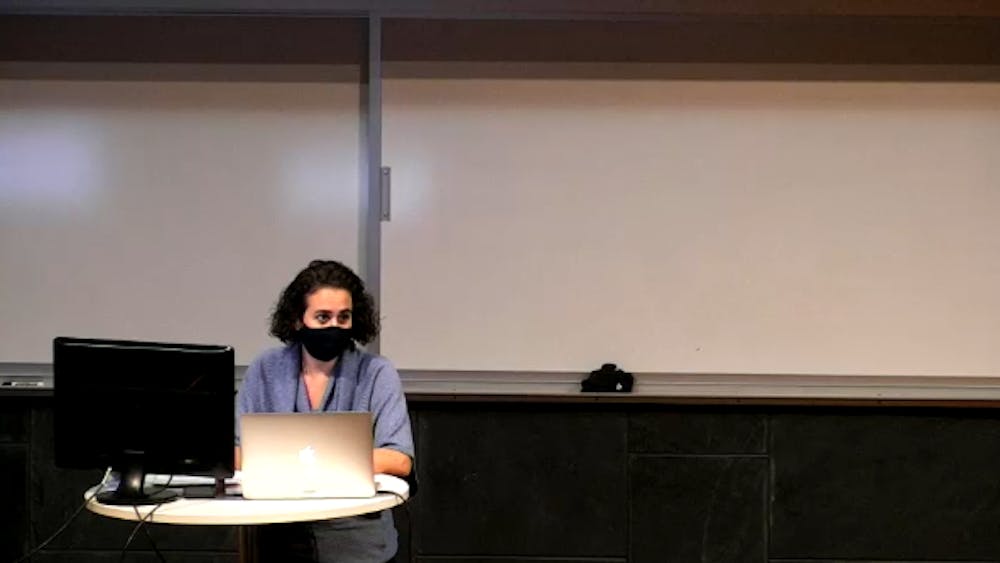Academic Senate discusses new Study Abroad Committee

Academic Senate Chairperson Katrina Piatek-Jimenez listens as senators debate and discuss the new Study Abroad Committee in the French Auditorium Oct. 6.
The Academic Senate passed a motion to create the Study Abroad Committee at its meeting on Oct. 5.
The new committee, overseen by the senate, will make decisions about study abroad programs moving forward.
The Office of Global Engagement’s (OGE) study abroad approval process was suspended by President Bob Davies on Oct. 4. His memo to the senate said the curricular review process created “unintended consequences” for faculty who were trying to approve international trips amidst the pandemic.
A substitute proposal was introduced to change the new committee’s outline. Senator Deborah Gray said the changes were needed because it did not do enough for faculty who have had concerns with the OGE.
Senator Scott DeBrestian said the OGE’s previous process made it far too difficult for faculty to approve their study abroad trips. Some faculty, he said, gave up on their programs to avoid “jumping through hoops.”
Chairperson Katrina Piatek-Jimenez acknowledged guest professor Michael Mamp to speak about the changes.
“We appreciate the suspension of this really horrible process that (faculty) have gone through for the past 14 months,” Mamp said. “But (we) were concerned when we read the charge of the committee, in that it retains some of the key issues that we were not happy with.”
Senator Jodi Brookins Fisher read a statement on behalf of Lana Ivanitskaya, health administration faculty member.
“For over a year, study abroad faculty leaders were patient and compliant,” Ivanitskaya’s statement said. “We tried to make our long-established programs fit the new model, but it was like fitting a saddle on a cow. We had to add OGE-imposed, irrelevant course objectives and pad extra program days at a significant extra cost to our students and academic programs. Once again, it’s Friday at CMU when it’s Monday everywhere else.”
The end of the statement received applause from several senators in the room.
The senate also discussed several other issues during its meeting.
Shared Governance
In his report, Davies addressed senators’ concerns with shared governance from the previous meeting. Davies said the pandemic required him to make decisions much quicker, eliminating the “lengthy deliberation and discussion often associated with the formal structure of shared governance.”
Davies said he will be creating a task force to evaluate and improve the university’s system of shared governance.
“I understand I may not yet fully grasp the nuances of this community’s preferred execution of shared governance,” Davies said.
COVID-19 Updates
The president and provost’s joint report gave updated vaccination rates for the CMU community. According to the report, 71.9% of students, 90% of faculty and 91% of staff are vaccinated. The total vaccination rate is 74.8%.
The report also detailed how many students, faculty and staff fill out the health screen symptom tracking app. The report said 23% of students, 33% of faculty and 54% of staff have filled out the app daily.
The seven-day moving average for new cases is 7.29 per day.
Marquee Programs
In his report, Davies announced there will be a panel discussion at the Nov. 9 senate meeting. The panel will explain the process behind selecting marquee programs.
Davies said the university's efforts had been focused on building interest in programs and increasing enrollment. He acknowledged that he could have better communicated the creation of the list.
Faculty Advisors
Several senators spoke up in response to part of the joint report on academic advising. The report said students can have both staff advisors appointed by departments and faculty advisors. Senator Ben Heumann said faculty are often left out of advising processes, but it is still important students know what resources are available to them.
Heumann said he heavily encourages students to talk to faculty.
“Faculty have been entirely excluded from communications to students about advising,” Heumann said. “Faculty know the skills that are in demand in our industries. We understand our fields, and in many of those fields it’s not as simple as picking a major that has the same title as a job a student wants. It requires a more nuanced plan that is best done in consultation with people who have decades of experience in their field.”
Academic Senate meetings are held from 3:30-5 p.m. bi-weekly on Tuesdays in the French Auditorium. Livestream and recording links can be found on the senate website.






